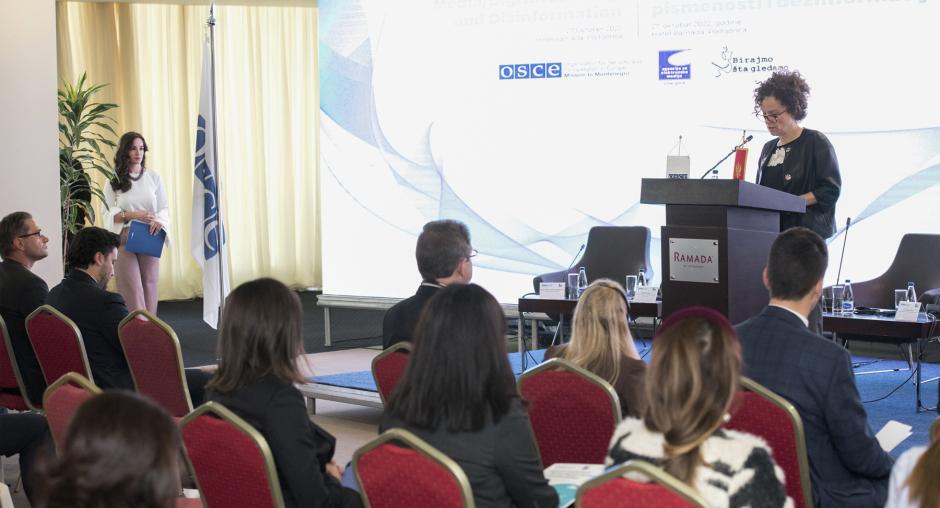Media literacy and disinformation focus of regional conference held in Montenegro

PODGORICA, 27 October 2022 - Independent, diverse and quality public-interest journalism and widespread media-literacy are the best antidote to disinformation. These were some of the conclusions from a regional conference on Media and Digital Literacy and Disinformation, held by the OSCE Mission to Montenegro and the Agency of Electronic Media today.
Opening the conference, Prime Minister Dritan Abazović said that democracy is only as solid as far as society fully understands and exercises the rights and responsibilities to freedom of expression and the right to know: “Montenegro is on a path towards improving the legislative and social framework for freedom of the media. This goal is an obligation we have as OSCE participating State and member of the Council of Europe, as well as in the context of our European integration.”
He added that Montenegro is particularly dedicated to address challenges in the online sphere, including the effect of disinformation and hate speech on freedom of expression and media pluralism. “I express my appreciation and full support to the current OSCE activities in the sphere of media freedom and development in Montenegro.”
“Disinformation, sometimes referred to as ‘false’ or ‘fake news’, may pose threats to democratic societies. There are two ways to reduce the risk of distortion of public opinion: first is the role of the media, and second is media and digital literacy that should equip the society with skills to recognize fake news,” said Dominique Waag, Head of the Mission to Montenegro.
She added that media freedom and development are at the core of the Mission’s mandate: “We tailor our support to Montenegro to enable a professional and ethical media environment, promote the safety of journalists, and strengthen the capacities of media-related institutions and regulatory frameworks. Journalistic ethics remains inseparable from self-regulatory mechanisms, whose strengthening the Mission has supported since 2014.”
OSCE Representative on Freedom of the Media Teresa Ribeiro emphasised that the best antidote to disinformation is independent, diverse and quality public-interest journalism: “We need to step up efforts to uphold journalistic standards and ethics through self-regulation, enhance timely and effective access to public information, invest more in investigative journalism and fact-checking, and very importantly, support media literacy programs for the wider public. Media literacy is an important tool for making the public resilient against the spread of disinformation and misinformation. If people can think critically, one does not need to prohibit and restrict: the consumers of news can perfectly filter out fake news themselves.”
Branko Bošković, President of the Agency for Electronic Media’ Council, said that the Agency strives towards strong and independent media, able to cope with the challenges they face, and to have journalists who know how to protect the highest standards of journalism.
“We provide knowledge and information to citizens, so they are able to deal with the increasing amount of data coming from different sources, which are misinformation, disinformation, hate speech and other illicit forms of speech. Media literacy is a priority activity and we foster critical thinking as one of the guiding principles in forming opinions,” he added.
“Media literacy is included in the Law on Media and the Draft Law on Audio-Visual Media Services. The Law on Media, via the Fund for Media Pluralism, prioritizes media literacy and media professionalism for the allocation of financial resources,” said Neđeljko Rudović, Director General for Media at the Ministry of Culture and Media.
The event gathered around 80 media literacy experts from Bosnia and Herzegovina, North Macedonia, Serbia and Montenegro. The conference was also an opportunity to present and distribute the Media and Digital Literacy Booklet, jointly developed by the Mission and the AEM.
